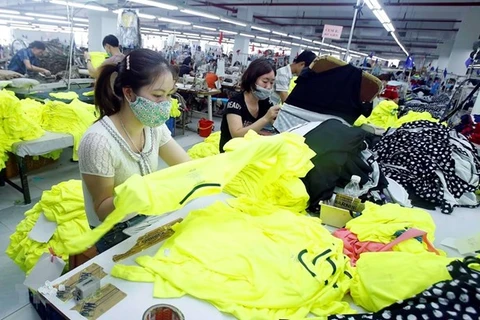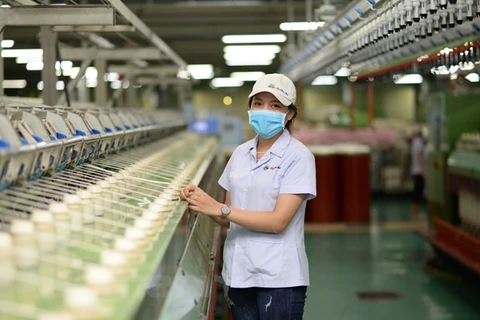 EVFTA opens up many opportunities for cooperation and exchange in trade between Vietnam and the EU. (Photo: Vietnam +)
EVFTA opens up many opportunities for cooperation and exchange in trade between Vietnam and the EU. (Photo: Vietnam +) On June 8, during its ninth session, the 14th National Assembly approved a resolution ratifying the Vietnam-EU Free Trade Agreement (EVFTA), marking a new turning point in economic, trade and investment cooperation between the two partners.
Minister of Industry and Trade Tran Tuan granted an interview with reporters on this occasion, mentioning tasks set out to make the most of the benefits it brings.
- Hello Minister, as the main agency in building the action programme to implementing the EVFTA, please explain what has been done by the Government and relevant ministries in preparing for the implementation of the agreement?
Minister Tran Tuan Anh: As a rule, the Agreement shall enter into force on the first day of the second month following the month in which both parties have notified each other of the completion of internal legal procedures for the entry into force of this Agreement. In order to ensure that there is sufficient legal basis for the implementation of the Agreement, the Government has directed the ministries and branches for urgent review to enable the immediate development of normative legal documents at the Government level, ensuring that these documents are issued at the time the EVFTA Agreement takes effect. In case of necessity, the Government will also consider promulgating according to simplified procedures for these documents.
Each government agency is assigned with specific tasks with the aim of implementing the EVFTA efficiently and ensuring the full realisation of Vietnam’s commitments in the deal.
In order to effectively implement this agreement, the Ministry of Industry and Trade proactively reported to the Government a plan to submit to the National Assembly to allow the immediate implementation of important provisions such as the Intellectual Property Law, or the Insurance Law, to serve both sides’ enterprises.
In addition, the Ministry of Industry and Trade is working with the Ministry of Agriculture and Rural Development to develop a Decree guiding the registration process for rice certificates, with the policy of building a flexible mechanism to facilitate businesses to take advantage of the incentives that the EU offers Vietnam in the EVFTA framework.
- What is your perspective on Vietnamese enterprises’ capability for tapping into the EU market from this agreement?
Minister Tran Tuan Anh: The free trade agreement between the EU and Vietnam is a lever for growth, bringing the possibility of becoming more involved in a market with a gross domestic product (GDP) of 18 trillion USD.
With a foreign trade volume of about US$41.3 billion, the EU is currently among Vietnam’s largest trading partners.
The EU’s main exports to Vietnam are high tech products, including electrical machinery and equipment, aircraft, vehicles, and pharmaceutical products, while Vietnam’s main exports to the EU are telephone sets, electronic products, footwear, textiles and clothing, coffee, rice, seafood, and furniture.
Vietnam's export market share to the EU only accounts for 2 percent, ranking 7th among export partners to the EU. This implies that the room for growth is still very large.
- According to the Minister, what are the biggest challenges for Vietnam’s small and medium enterprises when joining this agreement and what are the key tasks that the Government needs to implement in a short time to help businesses take advantage of the deal?
Minister Tran Tuan Anh: Businesses need to be more proactive in accessing resources, particularly small-and-medium-sized enterprises, though all should make comprehensive preparations and careful research of opportunities and challenges.
Enterprises are recommended to ensure that their products meet EU’s requirements on traceability, technical standards, as well as plant and animal safety and hygiene criteria.
There is another important task that ministries and agencies need to focus on, which is providing training for human resources of small-and-medium-sized enterprises to gain more knowledge about international trade and integration.
- Thank you very much, Minister!
(Vietnam +)























